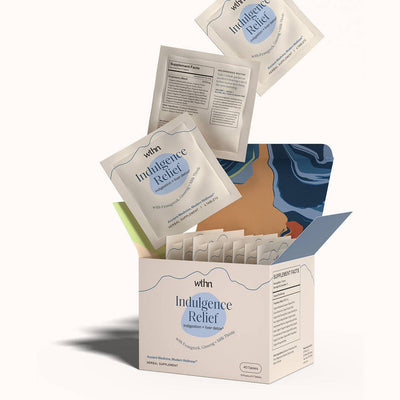We’ve all had that feeling when you’ve finished a meal but it hasn’t quite finished with you. Your stomach gets big, hard, painful, and starts talking to you. Belly bloat doesn’t just make you look five months pregnant, it can be a sign of a serious health condition.
Get the skinny on belly bloat
People often confuse belly bloat with another dreaded weight gain problem — water retention. While water retention is a build-up of water in the body that can cause puffiness and bloat, belly (abdominal) bloating happens when the gastrointestinal (GI) tract is filled with air or gas.
Gas is inevitable when it comes to eating — gut bacteria in our bodies naturally produce gas to help digest the food we eat. We also consume gas when we swallow air while eating. If your GI tract isn’t moving efficiently, the gas from the bacteria and the swallowed air can build up in the intestines. That excess gas or air can make you feel tightness in the abdomen and cause your stomach to distend. We all know what comes with that feeling — flatulence, frequent belching, and the tummy gurgling. It goes without saying those symptoms can make eating a not so fun activity if it happens often.
While bloating sucks, it’s your body’s way of telling you something is not quite right.
Why does my stomach bloat after eating?
As we said, food is a common culprit of bloating. Food intolerance and sensitivity can cause bloating and discomfort. It’s important to note food intolerance — difficulty digesting particular foods — is not the same as food allergies — an immune system’s reaction that affects several organs that can be severe and life-threatening, although some symptoms can be similar.
Food intolerances and sensitivities are common and on the rise (it’s estimated about 20% of the world’s population has a food intolerance). Common bloat-inducing food intolerances include:
-
Lactose intolerance ‒ our bodies need lactase, an enzyme that breaks down a sugar found in milk and dairy products called lactose, for proper digestion and absorption. Unfortunately, about 65% of humans have a reduced ability to digest lactose after infancy. In the United States, about 75% of Black people are lactose intolerant.
-
Gluten intolerance ‒ gluten is a protein found in wheat, barley rye, and triticale (a hybrid of white and rye). This insensitivity can cause several uncomfortable symptoms including bloating. Gluten intolerance is often confused with celiac disease, an autoimmune disease, often because the conditions have similar symptoms. While one in 20 people have a negative reaction to gluten when a person has gluten sensitivity they do not experience the immune response or intestinal damage that occurs in celiac disease.
-
Caffeine sensitivity ‒ caffeine is a stimulant that reduces fatigue and increases alertness, which is amazing when you’re pulling an all-nighter. However, some people have a hypersensitivity to caffeine, which decreases the ability to metabolize and excrete caffeine. This can cause rapid heartbeat, anxiety, jitters, restlessness, and bloating.
-
Fructose intolerance ‒ a simple sugar found in fruits, vegetables, and sweeteners like honey and agave, fructose can be hard to absorb in the blood for some people. When this happens, the fructose travels to the large intestine, where it is fermented and causes gastric distress.
- FODMAPs ‒ FODMAP stands for fermentable oligosaccharides, disaccharides, monosaccharides, and polyols. Fancy words for carbs naturally found in foods that can cause digestive problems. FODMAPs are poorly absorbed in the small intestine and travel to the large intestine where they are used as fuel for gut bacteria that break down the FODMAPs, which produce bloating-causing gas. FODMAP intolerances often occur in people with irritable bowel syndrome. There are a bunch of foods high in FODMAPs, including:
- Apples
- Artichokes
- Beans and lentils
- Beer
- Bread
- Honey
- Milk
- Soft cheeses
Can stress cause bloating?
It is not uncommon when you’re stressed out to experience abdominal pain and discomfort. We might not realize it but our emotional/mental state can have a great impact on our physical experiences.
We often joke that we have a second brain in our genitalia (or at least men do) but our second brain actually resides in our guts. When we’re stressed out, our stomachs let us know first. When we get stressed out, our brains set off alarm bells throughout the body. Our adrenal glands, which are in the kidneys, answer the call by releasing a surge of stress hormones — including adrenaline and cortisol.
When that happens your body reprioritizes natural functions, including digestion. The blood that is necessary to digest food is redirected from the intestines to wherever the body thinks it’s more needed. Without that blood, your stomach goes into a bit of a tailspin. You produce and secrete fewer stomach enzymes that aid in digestion. This causes your digestion to slow, which can cause bloating and discomfort.
For those who suffer from chronic stress (face it that’s most of us right now), the stress-induced bloating becomes cyclical. Bloating and other digestive symptoms can trigger stress, creating a never-ending cycle of discomfort and frustration.
Other mental health conditions, including depression and anxiety, can cause bloating as well.
Medical reasons for bloating
In some cases, bloating is a symptom of a serious underlying condition, including:
- Cancer ‒ colon, ovarian, pancreatic, and stomach cancers can cause bloating
- Celiac disease ‒ an autoimmune disorder in which the immune system attacks the small intestine that is triggered by gluten.
- Constipation ‒ a condition in which one has fewer than three bowel movements per week, hard or dry stool, strains during bowel movements, and does not have a complete evacuation of the bowels.
- Gastroparesis ‒ sluggish emptying of food from the stomach to the small intestine.
- GERD ‒ gastroesophageal reflux disease (GERD) can cause a variety of symptoms, including bloating, belching and asthma.
- Irritable bowel syndrome – a disorder affecting the large intestine, which can cause cramping, abdominal pain, bloating, gas, diarrhea or constipation, or both.
- Inflammatory bowel disorder ‒ an umbrella term for a disorder that causes chronic inflammation of the GI tract. These conditions include:
- Crohn’s disease ‒ inflammation of the lining of the GI tract that can cause bloating, severe diarrhea, fatigue, weight loss, and abdominal pain.
- Ulcerative colitis ‒ a disorder that causes irritation, inflammation, and ulcers in the lining of the colon.
What helps a bloated stomach?
It’s important to find out what is causing the bloating to figure out how to stop it. Paying attention to what you eat — the size of the meal, what’s on your plate, and the speed at which you eat — can help determine the culprit.
Reduce your food portions
If you tend to feel stuffed after eating large meals, consider reducing your portion size. Even if you’re staying within your daily caloric goals, you may want to consider reducing the size of your meals and adding another daily meal to make up for the smaller portions. Also focusing on your chewing can help reduce bloating. If you chew your food better you can reduce the amount of air you swallow with the food and make you eat slower, which helps reduce the food intake and portions.
Keep a diet log
If you are concerned your bloating is related to food intolerance, keep a log of what you eat for two weeks and how you feel after your meals. You can then discuss your experiences with a registered dietitian who can make diet recommendations. You can also take a food allergy or food intolerance test at your doctor’s office or buy an at-home testing kit, however, studies have found often test results can be misinterpreted.
Avoid fatty foods
Bad news if you love a high-fat meal — it takes your body a bit longer to digest the food. The slow-moving fat can cause bloating. Different fats can make you feel differently. Pay attention to which types of fat cause you issues. As always, keep your intake of fried, processed, and refined foods, which tend to be high in trans and saturated fats, low to help with digestion and overall health.
Limit carbonated drinks
No shocker here but carbonated beverages like sparkling water, club soda, seltzer water, and soda causes a build-up of card dioxide gas, which causes bloating.
Get regular health screenings
While bloating is usually a natural response to food or lifestyle habits, it may be a symptom of something much more serious. You should consult with your doctor if the bloating is accompanied by cramps and abnormal bowel movements. Having regular health checks like an annual well check, well-woman checks, and colonoscopies can help catch chronic illnesses or cancers early.








Leave a comment